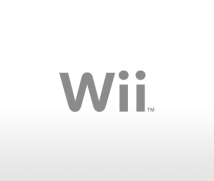2. Redefining the Game-User Relationship
Development started on Wii's Channels even before their ultimate form had been fully conceived. How did they come to take their present shape?
The more system function meetings that we held, the more ideas that were raised. Of course, a lot of ideas were discussed in those meetings, but we'd also bring a lot of them back to our respective departments and brainstorm further, thereby coming up with even better ideas. Looking at these ideas in relation to the "fun for the entire family" concept we mentioned earlier, we realised that it would be difficult to cater to an entire family with a single piece of software, or with a single approach. That's when we decided to incorporate a large variety of features.

In retrospect, that seems very obvious, doesn't it? If you want more people to use your console, then you've got to provide them with more features. The drawback, however, is that it's harder to present everything in an understandable manner, isn't it?
Exactly. What we wanted to avoid when we incorporated more features was making things harder to understand. One thing that really clicked in our minds when we were talking over how to make things more understandable was the image of rows of TVs in an electronics shop. Lots of screens, lots of channels, all lined up. This is easy to understand and exciting on a really simple level. This gave rise to our Menu Screen, which consists of rows of panes.

We decided to use the term "Channel" at about the same time we decided upon the panes. We were having some difficulty in pulling together all the different ideas suggested to us by each department. In fact, we were more or less at a dead end. And then someone proposed that we try lining them all up. Seeing this, one team member remarked quite casually that the end result resembled the channels of a TV, and that's when it clicked. I mean, at that moment, the atmosphere was electric. When I first heard the word "channel", it enveloped the whole idea, even though I wasn't fully aware of its appeal. Looking back, I think this is when I first realised that these "panes" would play a leading role in our interface.
That's always how it happens when a decision is made, isn't it? Someone makes an offhand comment, and it instantly takes root, especially when you're having trouble coming up with an idea.
Yes, that's exactly how the decision was made.
Looking at the panes used for the Wii Channels, developed with such difficulty, the creators' attitude can be clearly seen in the way that the three rows of four Channels are treated equally. Normally with a console, you would want to make the "Disc Drive" Channel for a game inserted in the drive larger than all the other Channels, wouldn't you?
Absolutely. Given that Nintendo's core-business has traditionally been making games, some might consider it strange that the "Forecast", "News" and "Game" Channels are given equal weight. Our team, however, had few doubts about this. The main reason I can give for our conviction was the "fun for the entire family" concept. Another big factor was that the Nintendo DS had been well received by so many people.
The release of the Nintendo DS was based on our own beliefs concerning what people wanted, and the DS clearly resonated well with consumers. This success spurred us on to form our next set of beliefs about the market for Wii.
Yes, the Nintendo DS proved that it's okay to have a variety of software, rather than just conventional games. This proved to be a major consideration when creating Wii's Menu screen. We felt that people who want to play games should be able to do so, while people who are interested in other features should be able to enjoy those Channels.
This vision was pursued with absolute conviction, at least by the people that attended those system function meetings. It's true, however, that there was initially a divergence of opinion with some members of the company who hadn't yet had access to all this information. Whenever that happened, Tamaki-san would scramble into action to shed some light on our vision using that "passion" of his! (laughs)
(laughter)

Well, of course, it was difficult for them to tell just how interesting the individual Forecast or News Channels would be by simply looking at the completed Menu. I guess this reaction was only natural. I mean, looking at just the news or weather on their own, you will question how interesting they'll be, won't you?
In actual fact, the Forecast and News Channels include ideas unique to the Wii. We'll explain these another time though. One obvious argument against these Channels was that the news and weather can be checked using a computer. Some people said that Wii was becoming more like a PC than a games console. What conclusions did you draw from this?
This kind of overlaps with what Kuroume-san said earlier, but I was very aware of the fact that people obviously have a wide variety of interests. Looking at Nintendo DS software sales alone, you can see that while non-conventional games such as "Brain Training" are flying off the shelves, more conventional games like RPGs are also selling well. To be honest, we did contemplate making the Disc Channel button stand out more when we first started planning the Wii Menu screen, but in the end, we felt that this kind of thinking was too orthodox. It's no different from the logic stating that if you release a top-class game, everyone will play it. However, we hoped that by equipping Wii with a variety of features catering to a host of people, then Wii could be the point where all these overlapping interests would converge. I think we ended up with the broad principle that the Menu should be full of variety, since the age and interests of each family member also vary. That said, I'm not sure that everyone would agree with me, but when deciding upon the features we were completely confident in our conclusions.
Rather than us being uniquely far-sighted, I think we were simply fortunate enough to have had the chance to develop this concept before anyone else. Speaking personally, Wii has changed my preconceptions of what a console can do, and I am convinced it will change other people's preconceptions, too. Being a collection of experiments, Wii may initially bewilder people, even make them feel uneasy. But when these people actually try it out for themselves, it will soon seem natural. Perhaps Wii is more about "experiencing", rather than "understanding"?
Perhaps some people will take longer to get used to Wii than others. Kuroume-san, when were you convinced that you had come to the right conclusion?
When was I convinced…? I'm not sure if this will answer your question, but at some point in the future, I'd like to try designing a completely new Channel for Wii myself. When I first felt this urge, well, I think that's when I first felt confident about Wii's Channels.
Because you've got such a wonderful box, you want to make something to put in it.

Exactly, that's the kind of process we're talking about. Wii's Channels won't end with the first 12. Up to 48 channels can be added at the moment, meaning that the user will be able to download more Channels.
We could have gone on creating Channels forever, so we eventually had to draw the line somewhere. But we've actually got a number of great Channel ideas in the pipeline already, don't we?
Yes, we're still holding planning meetings and still talking about what we can do. I think this is only possible because of our confidence in Wii's Channels.
So, with that, I'd like to ask a question to you all. Which of the existing Channels appeals to you the most? Starting with you, Tamaki-san.
Hmm… Well, it's not yet the official name, but I personally like the so-called Shopping Channel. Put simply, this Channel allows the user to purchase a variety of software via their Wii, starting with Virtual Console titles. In other words, they'll be able to purchase titles that they may have played on past Nintendo systems, like the NES, SNES, and Nintendo 64. It's conceivable that Wii-dedicated software will eventually be available, too, and I personally feel that this Channel will pave the way for a new kind of game development. In fact, there's a phrase that Iwata-san mentioned before that caught my attention: the issue of "price variety".
Ah… software prices.
Yes, your idea of setting various software prices.
Well, allow me to explain, since this is something I started. Basically, I want to expand the range of prices at which games are sold. For example, Nintendo’s general approach until about 5 years ago was to more or less fix software prices at 4800 yen for handheld games and 6800 yen for home console games. Now I think that this approach might have been wrong. Frankly speaking, if all home console titles are released at 6800 yen, then a simple game like Tetris would never see the light of day on this format. I mean, I don't think our customers would shell out up to 6800 yen just for Tetris. So, can we justify selling Tetris at this price by adding thirty new game modes, or by adding some fancy movies? In short, we can’t, and that’s a problem. Another problem is whether differing production costs should be reflected in the price, or the differing sense of value created by how long a game will take to complete, or its difficulty level. Of course, some people think that the price of software should decrease over time. However, long-term price cuts aside, if you lower the price of your software suddenly, people who have already purchased the title will feel cheated. This is something I want to avoid. In this sense, I feel it would be better for software to be released at a range of prices that are appropriate for the software right from the start. Nevertheless, you'll never be able to set a price lower than the norm if you try to sell a game using existing means of distribution, that is, as long as this is a business in which you have the added cost of making ROMs and discs to sell. Shops won’t make a profit if you make your title too cheap, meaning that they won’t stock it, and at the very least, the maker can't set the price lower than the cost of the media format. There are little games which are great fun but don't take long to complete. As things stand, it's impossible to, for example, sell these for 1000 yen. These ideas just die on the vine and I've always wondered if there might be some way to save them. Although we're currently trying to introduce a variety of prices into the Nintendo DS line-up, this is really something that I’ve been talking about for a while, isn't it?
Yes. To be honest, I only came to understand this way of thought when I started working on Wii's system functions. But like we've said, when you think of the variety of individuals that make up a family, and their range of interests, you understand that variations in price are only natural. There are people who won't hesitate to purchase expensive products because they like them, and there are people who will scour flyers and coupons everyday for a good deal. Just as it's only natural for people to frequent different kinds of restaurants, it's only natural for products to be sold at a range of prices. The Shopping Channel is full of potential in the sense that it will allow us to sell software and expand our user-base, outside the bounds of the traditional software pricing framework. Needless to say, products distributed by conventional channels of distribution are still important. However, if the Shopping Channel makes it possible for simple ideas and small experimental titles to be sold at a lower price, I think this would greatly expand the possibilities of what developers can do.

It's even conceivable that we'll take titles that have been popular on the Shopping Channel, develop them further and release them properly at standard prices. Talking of potential, we may even be able to create a forum where amateur developers can try releasing games they have made, although this will be hard to do in the immediate future. The mechanics of the games industry at the moment don't allow for games to be sold unless they're widely advertised by major publishers to make maximum profit. This seals off gateways into the game industry for new talent.

That's right. Maybe the Shopping Channel will open up some doors.
I'm quite intrigued by the Internet Channel. This Channel allows you to view the Internet using a browser called Opera. I feel that being able to browse the Internet via your TV is quite a big deal. While you might still read blogs using a computer, the fact that you can quickly look up something that catches your attention while watching TV is very convenient.
Certainly. I think the convenience that stems from being able to use the internet while watching TV is something which depends on the environment of the user. For example, for someone living alone, they might very well say that they're already doing this, since it's quite common for their TVs and computers to be located close to each other. Even someone living with their family can use the Internet while watching TV if they have a laptop connected to a wireless network in their living room. Bearing all this in mind, the potential I see in the Internet Channel lies in the fact that the Internet, which has until now been viewed alone, can now be viewed by everyone. With a computer, even if you have people peering over your shoulder to see the screen, the limit is pretty much two, with four or more people looking at the same screen being totally out of the question. With the Wii, which is connected to the living room TV, families will be able to enjoy the Internet together. I don't know what lies ahead, but I think this has the potential to change the way we live.
At the end of the day, all of the proposals we made for Wii were related to lifestyle choices, redefining the relationship between people and their consoles. I believe that all the thought and effort we've put into developing the system functions is ultimately related to this
I agree. And finally, Aoyama-san, what Channel are you keeping your eyes on?
I also think that Opera's browser is shaping up nicely. That and the Wii Message Board, although this is, strictly speaking, not a Channel.
Ah, we must talk about that as well!
